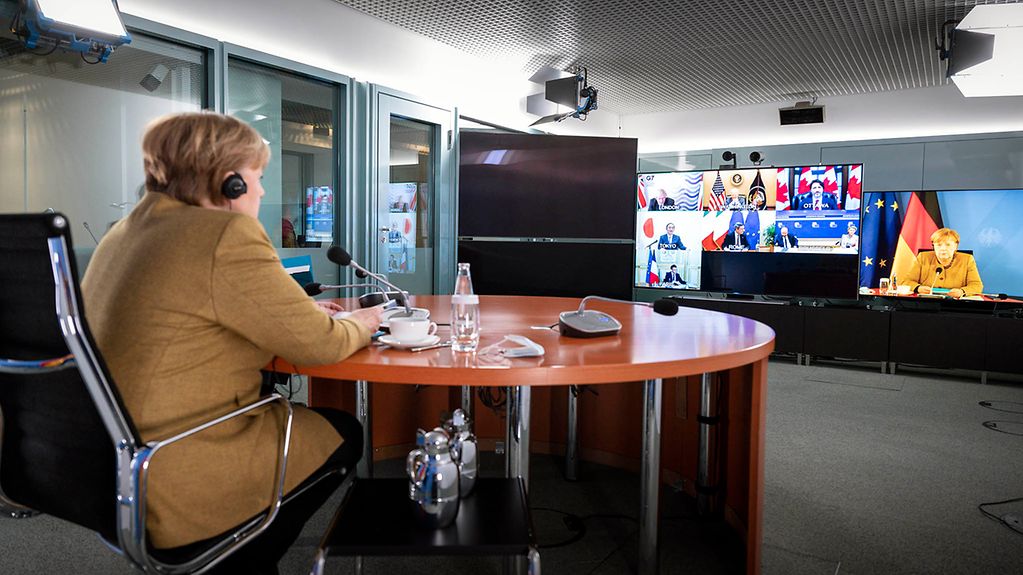G7 video conference
The G7 intends to push ahead with the fight against the COVID-19 pandemic in poorer countries, and is providing additional billions of dollars to this end. Germany alone has pledged 1.5 billion euros, making it the largest financier of the COVID-19 Vaccines Global Access initiative (COVAX).
3 min reading time

Chancellor Angela Merkel at the consultations with G7 heads of state and government
Photo: Bergmann/Bundesregierung
What was the G7 video conference about?
The UK Presidency hosted the special online meeting of the G7 to focus primarily on aspects of multilateral cooperation and on combating the pandemic and bringing about economic recovery. The main items on the agenda were containing the pandemic and ensuring a fair distribution of vaccines.
Who attended?
Alongside the host, British Prime Minister Boris Johnson, the meeting was attended by the Chancellor and the heads of state or government of all other G7 nations (US President Joe Biden, Japan’s Prime Minister Yoshihide Suga, Italian Prime Minister Mario Draghi, French President Emmanuel Macron, Canadian Prime Minister Justin Trudeau) as well as Charles Michel, the President of the European Council, and Ursula von der Leyen, the President of the European Commission.
What did the G7 decide?
In the Leaders’ Statement, the seven leading industrial nations underlined their determination to cooperate in order to beat the COVID-19 pandemic, and help the global economy to recover. They also noted that they intend to make 2021 a “turning point for multilateralism”.
The G7 stated that they had stepped up their financial pledges for the COVID-19 Vaccines Global Access (COVAX) in poorer countries by more than four billion US dollars. Germany alone pledged another 1.5 billion euros. “It is a very basic question of fairness,” said Chancellor Angela Merkel.
How is global vaccine distribution organised?
The World Health Organization (WHO) and other global actors together founded the Access to COVID-19 Tools (ACT) Accelerator“ in April 2020. The goal is to develop, produce and equitably distribute COVID-19 vaccines, tests and treatments.
COVAX (Covid-19 Vaccines Global Access) is the vaccine pillar of the ACT Accelerator. The initiative, which is led by the WHO, GAVI (The Vaccines Alliance) and CEPI (Coalition for Epidemic Preparedness Innovations), is working to ensure that vaccines are accessible and affordable for all countries. By the end of 2021, some two billion doses of vaccines are to be available.
How is Germany involved?
Germany is working with its international partners for fair, affordable global access to vaccines, treatments and tests. That is why Germany has contributed 600 million euros to the ACT Accelerator, with a special focus on its vaccine pillar COVID-19 Vaccines Global Access (COVAX).
Chancellor Angela Merkel has now pledged another 1.5 billion euros, making Germany the largest single donor – ahead of the USA and the United Kingdom. Germany is also to explore ways of supplying developing countries with products in addition to financial assistance to enable countries to purchase COVID-19 vaccines, explained Angela Merkel.
What does that mean for Germany?
For Germany that means, said the Chancellor, that as well as providing financial assistance, the country might need to “pass on” some of the vaccines it has already ordered to poorer states. It is not yet clear on what scale and when. This will not, however jeopardise any vaccination appointments in Germany.
Who or what is the G7?
The Group of Seven (G7) is made up of the seven leading industrial nations: the USA, the United Kingdom, France, Italy, Japan, Canada and Germany. The European Union is also represented at all meetings. The G7 sees itself as a community of values that promotes peace, security and a self-determined life worldwide.
How does the G7 work?
The G7 is not an international organisation. It is an informal body. That means the G7 does not make resolutions that have any direct legal impact. It meets once a year for a summit that is hosted by the country holding the Presidency. Each G7 state holds the Presidency for a one-year period before handing over to the next state.
When will the regular G7 summit take place?
The United Kingdom took over the Presidency of the G7 in 2021. The regular G7 summit hosted by the UK is scheduled to take place from 11 to 13 June 2021 in Carbis Bay on the Cornish coast.